Reports of alleged weapons deal between Egypt and Russia heighten conspiracy theories on Arabic social media
Leaked US intelligence document alleging secret weapons deal between Egypt and Russia sparks conspiracy theories about America’s interests in Egypt
Reports of alleged weapons deal between Egypt and Russia heighten conspiracy theories on Arabic social media
Share this story
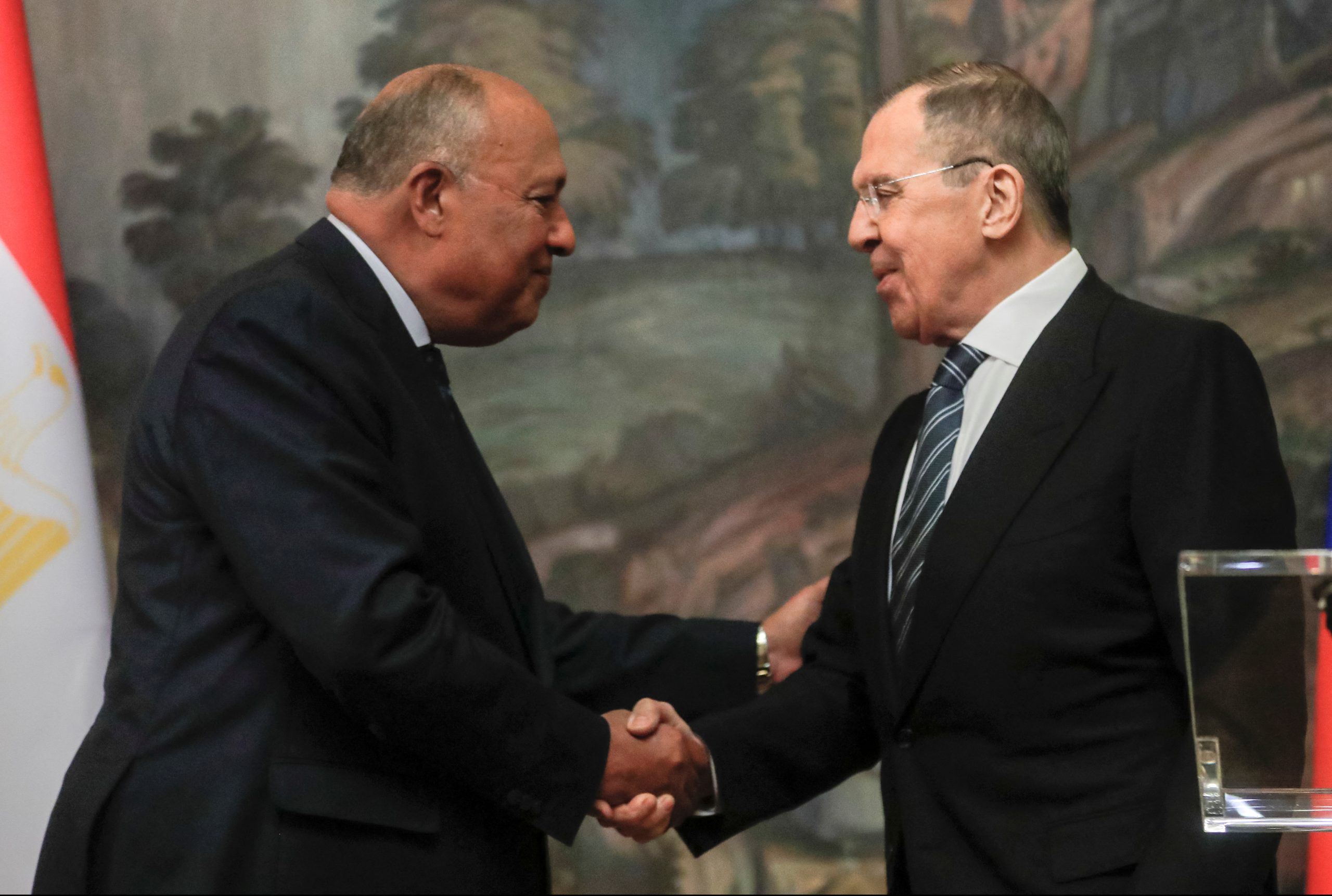
BANNER: Russian Foreign Minister Sergei Lavrov and Egyptian Foreign Minister Sameh Shoukry shake hands during a news conference following their talks in Moscow, Russia, January 31, 2023. (Source: Maxim Shipenkov/Pool via REUTERS)
On April 10, 2023, the Washington Post reported on alleged secret plans for Egypt to produce 40,000 rockets for Russia, according to a leaked US government document. In April, the DFRLab monitored Arabic social media, Egyptian media, and Arabic-speaking Russian media to analyze reactions to the news. Egyptian social media users, journalists, and political commentators condemned the news, attacked the article’s authors, and shared conspiracy theories about the United States’ alleged intentions in Egypt.
The leaked document was part of a larger US intelligence leak reportedly traced back to Massachusetts Air National Guard Jack Teixeira. Teixeira allegedly posted the documents in February and March on the online chat platform Discord. The document detailed instructions from Egyptian President Abdel Fatah El-Sisi to keep the production and shipment of weapons to Russia secret “to avoid problems with the West.” On April 17, the Washington Post reported on additional leaked documents outlining plans from Egypt to produce and supply weapons to Ukraine instead of Russia following a visit from US officials.
Egypt’s official denial of the claim that it was working with Russia came through an unnamed senior official who spoke to the Egyptian television channel Al-Qahera News, who called the leak “informational tampering that has no basis in truth.” Kremlin spokesperson Dmitry Peskov commented on the allegation, calling it “yet another false story, as there are many of them today.” The White House refused to comment on the document’s authenticity but said it had not seen any indication of Egypt “providing Russia with lethal weapon capabilities.” Despite the new documents and official denials from all parties involved, online reactions on Arabic social media analyzed by the DFRLab reflected long-held conspiracy theories that claim the existence of an alleged campaign against Egypt and its president.
Online reactions on Twitter
Recurring narratives spread on Arabic social media surrounding the news of the alleged Russia-Egypt deal included referring to the Washington Post as a politicized newspaper; claiming the existence of a campaign led by an unspecified private group; claiming the news is an attempt to spread rumors about Egypt; and accusations that the United States is trying to trap and remove al-Sisi by accusing him of interfering in the war in Ukraine. The tweets came from accounts whose profiles frequently posted content supporting al-Sisi and security forces, reflecting the political leaning of the accounts.
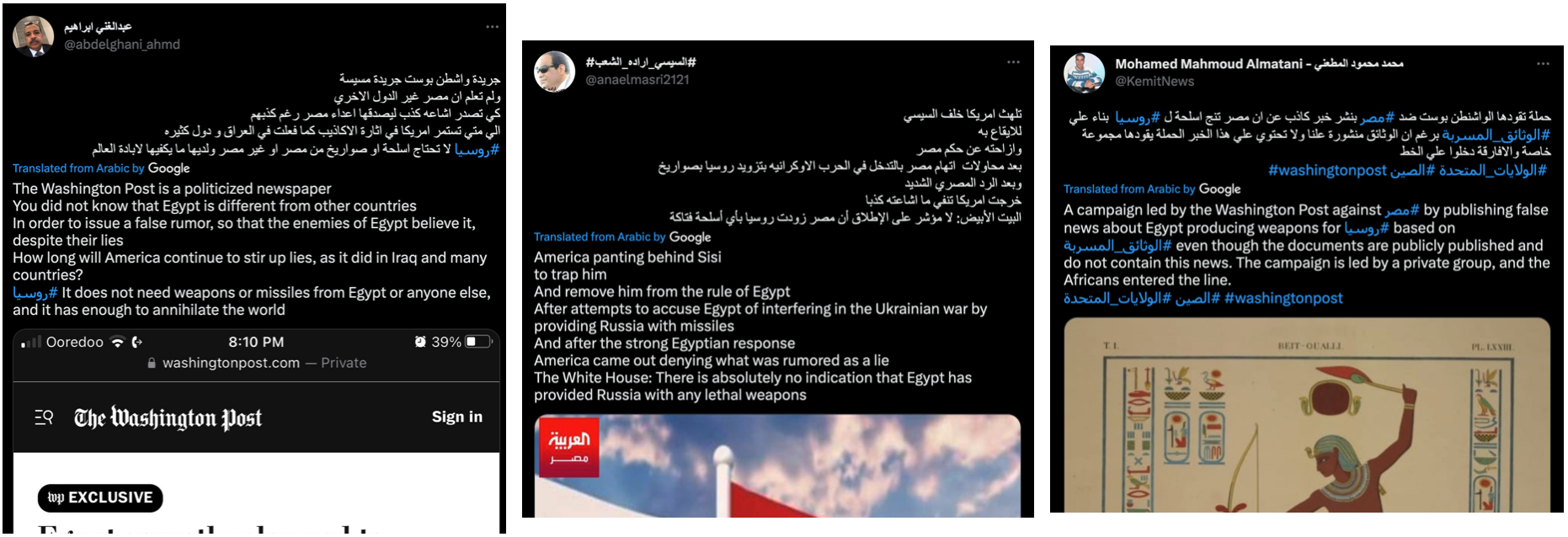
Abdelwahed Ashour, former managing editor of the state-run Middle East News Agency, tweeted about a media and intelligence war against Egypt, telling his followers to pay attention in the coming period as President Sisi, Egypt, and the army become the target of suspicious, organized, and coordinated campaigns. Ashour included the hashtag #مصر_مع_السيسي_قد_التحدي (“Egypt with Sisi up for the challenge”), which was amplified in April 2023 by accounts identified by the DFRLab as being part of a pro-government network on Twitter.
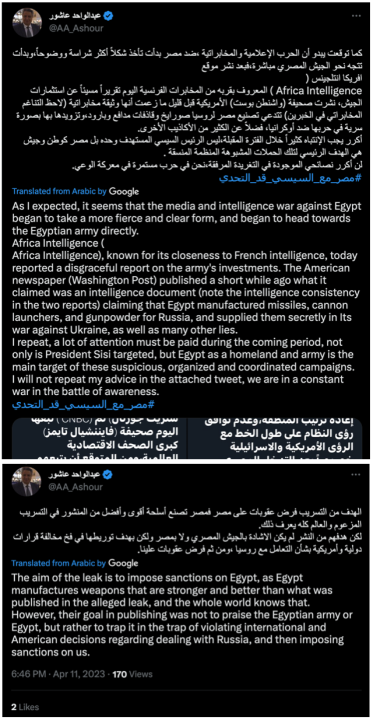
The hashtag was initiated by Twitter account @bassemelmassry4, which appears to be affiliated with the account @BASSEMELMASSRY. The account of @BASSEMELMASSRY was identified in a previous DFRLab investigation as initiating pro-government hashtags amplified by a network of suspicious Twitter accounts.
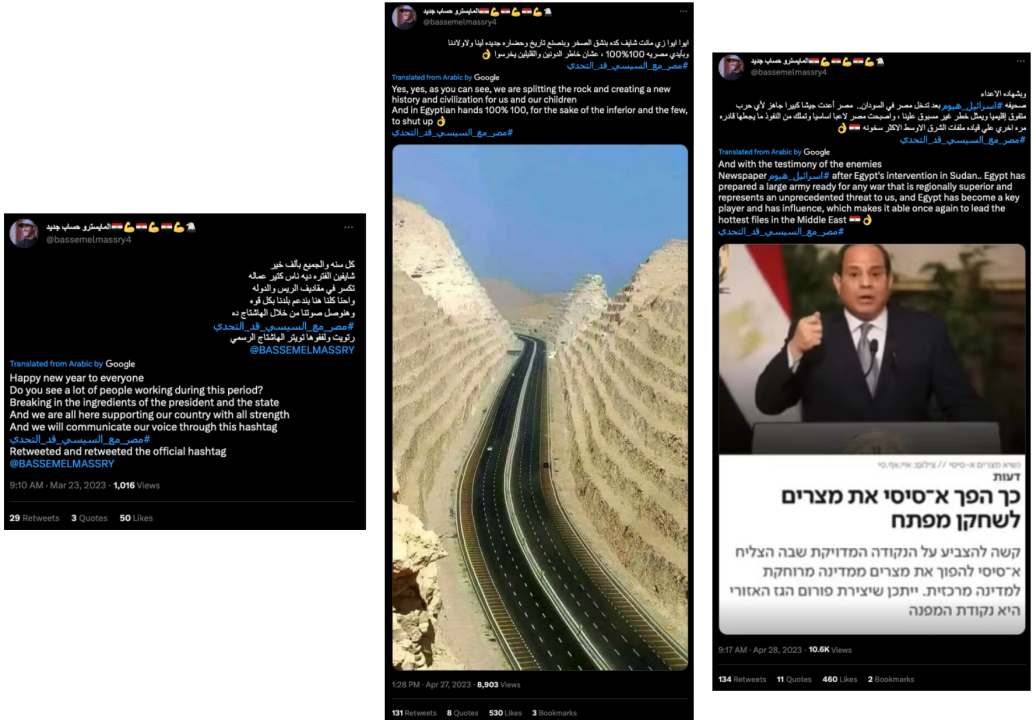
The DFRLab tracked the use of the hashtag using social media analysis tool Meltwater Explore and found that between March 1 and May 5, 2023, the hashtag was mentioned 30,517 times by 2,886 unique Twitter user accounts, reaching almost two million people.
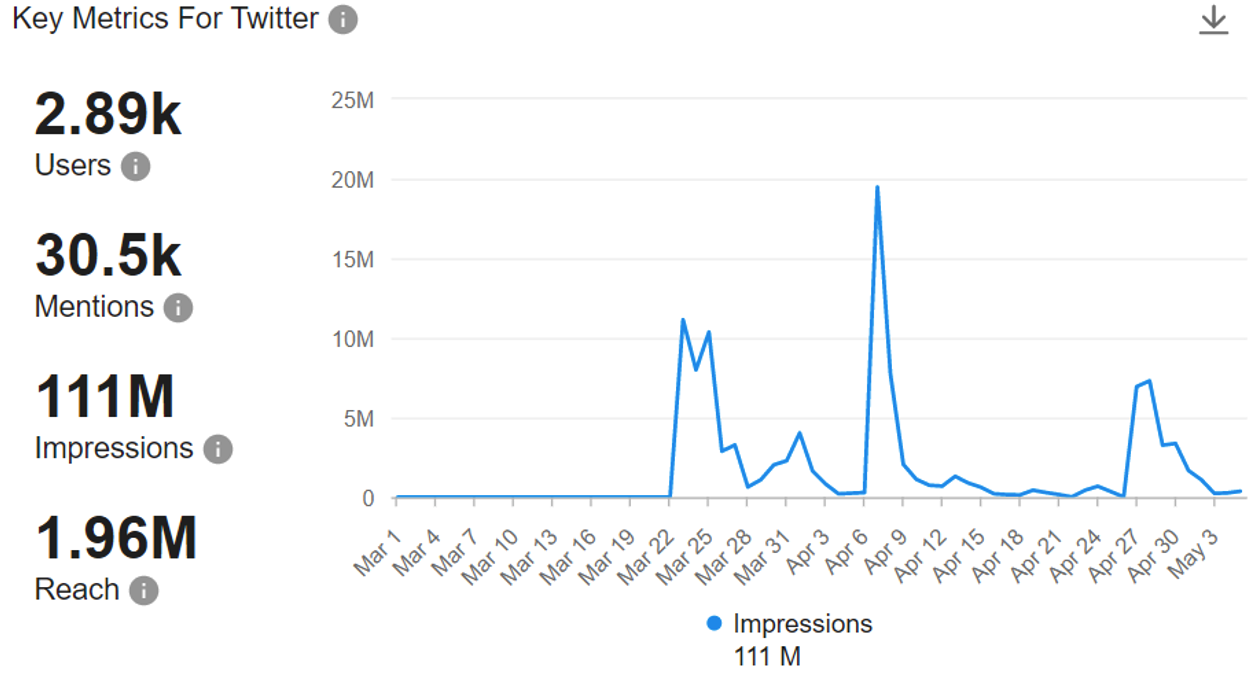
According to Meltwater Explore data, three of @bassemelmassry4’s tweets are among the top ten retweeted posts using the hashtag. The account @_SOLA_a3 is also among the top authors, with 1,212 tweets mentioning the hashtag. An account with an almost identical handle, @_SOLA_3, was previously identified by the DFRLab as one of the most active accounts in an Egyptian Twitter network amplifying pro-government hashtags. The @_SOLA_3 account appears to have been deleted or changed its account handle, as it currently returns a notification stating, “this account does not exist.”
Egyptian state media
Egyptian media outlets such as AlQahera News, Elwatan, Sada El Balad, Shorouk News, and news websites Egypt Window, Masrawy, and Mubasher Pulse all focused their coverage on Egypt’s denial of the weapons deal. An April 11 article in the state-run outlet Akhbar Elyom reported on Egypt’s denial and included a claim by Vasily Nebenzya, Russia’s Permanent Representative to the United Nations, that the US and its allies are exerting pressure on other countries to export arms to Ukraine.
AlQahera News television channel posted on YouTube an interview segment that aired live with the title “Washington Post’s failed attempt to harm relations between Egypt and America, details with our correspondent.” The segment included an interview with the channel’s foreign correspondent in New York, Yasir Noureldin, who criticized the Washington Post authors, as their pictures flashed on the screen, for lacking experience in military reporting. The correspondent also claimed that the authors might have racial agendas. The correspondent further claimed that the Washington Post’s credibility is declining.
Another segment aired by AlQahera News featured an interview with international relations expert Ashraf Singer who said that the Washington Post article included weaknesses and inaccuracies. Similar to the other segment, pictures of the authors flashed on the screen during the interview.
In an interview with the television channel Extra News, Ihab Omar, a state media journalist with Al-Ahram newspaper, attacked the authors and described the Post’s reporting on the leak as contradictory, weak, and far from professional. Omar also said that the article resembles “yellow journalism” intended to confuse as it was published despite US officials’ denying the news. In another televised interview with AlQahera News, Omar reiterated similar statements, stating that there are attempts to blackmail and create problems for Egypt’s foreign policy and relationship with the United States. Egyptian news outlets Al Dostor, Sada El Balad, and AlQahera News reported Omar’s statements in articles on their websites.
Russia’s Arabic media platforms
The DFRLab also analyzed the news websites and social media accounts of Russian-owned RT Arabic and Sputnik Arabic in April for reporting on the alleged weapons deal. The outlets’ reporting on the US intelligence leak mentioned that the accuracy of the documents is questionable and that the Pentagon has not authenticated the documents. The Russian outlets largely avoided reporting on the alleged weapons deal with Egypt, but RT Arabic reported on the White House denying an Egyptian weapons deal with Russia. Sputnik Arabic reported on Moscow’s denial and posted on Facebook about Egypt’s denial of the news, citing the Washington Post.
On April 12, RT Arabic posted an article titled “Egypt should demand compensation for the lie of ‘40,000 missiles to Russia.’ Experts read the reasons for what the Washington Post promoted.” The article quoted an Egyptian political analyst who said that Russia does not need rockets from Egypt and that this is an attempt to disrupt relationships and prevent Egypt’s influence in the region. An Egyptian state media journalist was also quoted in the article, saying that Egypt is targeted with attempts to stir up confusion and embarrassment in front of the world. On April 14, Sputnik Arabic posted a poll on Twitter with the question, “Have the Arabs begun to put an end to Washington’s dubious policies in the region?” Of the 156 voters, 79.5 percent voted yes.
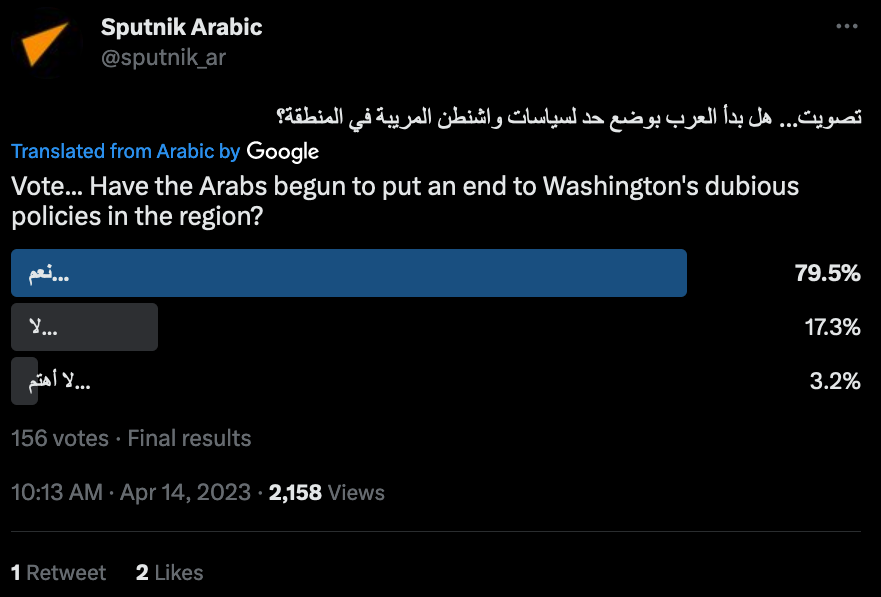
Russia increasingly utilized local media to influence and shape public opinion at home and abroad, especially regarding its war in Ukraine. Russia is able to deliver Kremlin propaganda to a significant number of Arabic speakers via RT Arabic, which is one of the most popular news sites in the region. A February 2023 DFRLab report on how the Kremlin employs information operations to erode global confidence in Ukraine revealed concerted efforts to target Global South countries, like Africa and Latin America, sometimes capitalizing on anti-Western sentiment to persuade these populations to support Russia.
The comments made by online users and highlighted in Arabic-speaking Russian media showcase the perception of Egypt’s complicated relationship with Washington and Moscow. Egypt reiterated in the wake of the leak incident that it remains neutral in the Ukraine war. Egypt has been a long-term ally of the US, receiving $1.3 billion annually in military assistance, making Egypt the third-highest recipient of US military aid. However, due to Egypt’s worsening human rights record, the US withheld part of the annual aid package last year, citing human rights violations, which continue to cause tension between Cairo and Washington.
Egypt has much to gain from maintaining its long-standing relationship with the US but has been gradually cozying up to Russia. Egypt is also growing heavily reliant on Russia for wheat, mainly to compensate for the fall in shipments from Ukraine due to the ongoing war. Moreover, Egypt has also strengthened its military ties with Russia since 2014. Egypt signed a contract in 2017 to purchase four SA-23 batteries and participated in Egyptian-Russian joint military exercises in 2021. However, as tensions between Washington and Moscow continue over the war in Ukraine, Egypt’s leadership will be walking a tightrope as it balances its relationships with the two superpowers in line with its interests.
Cite this case study:
Dina Sadek, “Reports of alleged weapons deal between Egypt and Russia heighten conspiracy theories on Arabic social media,” Digital Forensic Research Lab (DFRLab), May 19, 2023, https://dfrlab.org/2023/05/19/reports-of-alleged-weapons-deal-between-egypt-and-russia-heighten-conspiracy-theories-on-arabic-social-media/

